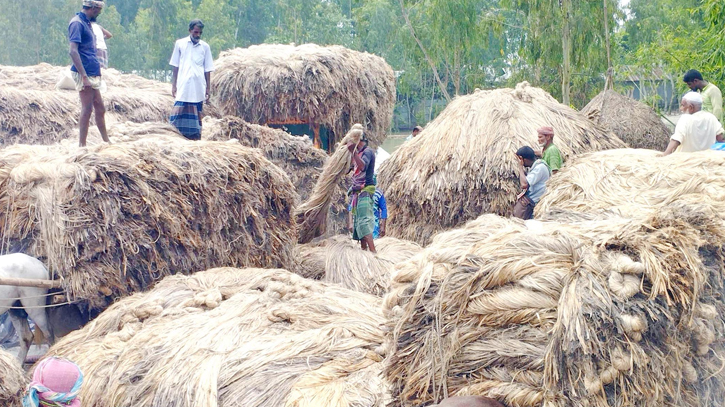
A local jute market in Jatrapur, under Kurigram Sadar Upazila, has been bustling with the presence of buyers and sellers. However, the smiles on the faces of jute growers are fading due to the low prices their yield is fetching. Photo: TDM
Farmers in Kurigram district are expressing discontent despite a successful jute harvest this year, primarily due to unsatisfactory prices for their produce. They are being compelled to offload their jute to local buyers at significantly reduced rates, resulting in financial losses.
In the current market, jute is being sold per mound at prices ranging from 1700 to 2000, dependent on its quality. While this year's jute cultivation met its target of 17,900 hectares of land in the district, with a production target of 2.52 metric tons per hectare, the farmers are disheartened by the lower-than-expected prices, which are even lower than the cost of production.
A visit to the traditional Jatrapur market in Kurigram Sadar upazila reveals that the market operates only two days a week. Approximately 2000-3000 mounds of jute are bought and sold here, with jute growers from various parts of the district coming to sell their produce. Unfortunately, the absence of direct selling opportunities at purchasing centers forces them to sell to local buyers at reduced rates.
Moksedul Alam, a 35-year-old farmer from Kazipara village in Bhogdanga union, Sadar upazila, firmly stated, "I refuse to sell my jute at such low prices. Currently, it's selling at Tk 1800-2000 per mound, excluding transportation costs. The cost of production on one bigha of land is around Taka 9000-10,000, yielding 7-8 mounds."
Another farmer, Anowar Hossain, 38, from Kaliganj village in Nageswari upazila, shared his experience, "I harvested 35 mounds of jute from my five bighas of land. I initially sold 20 mounds at Tk 2800 during the monsoon season, but the rest is being sold at Tk 1800-2000. On top of this, I have to pay Tk 15 for boat fare and Tk 50 as haat tax per mound."
Local buyer Jahedul Islam mentioned, "Jute was selling at Tk 2500-2600 per mound last week, but I purchased it at the highest rate of Tk 2000. I've bought 80 mounds of jute, and I'm at risk of incurring losses if market prices don't improve. Unfortunately, I don't see any possibility of price increases."
Similar situations were observed in markets at Pateswari, Kathalbari (Sadar upazila), Durgapur (Ulipur upazila), Kharibari (Fulbari upazila), Nageswari, and Chilmari upazila.
Kurigram Chief Inspector of Jute, ATK Khairul Haque, pointed out that jute prices were higher recently but have since plummeted. This decline is attributed to many jute traders not receiving payment for their supplied jute, resulting in a lack of liquidity among traders, leading to reduced enthusiasm for purchasing jute.
Deputy Director of Kurigram Department of Agriculture Extension, Biplab Kumar Mohanto, suggested that farmers might secure better prices if they store their jute for some time, given the current oversupply in the market.
TDM/SD








